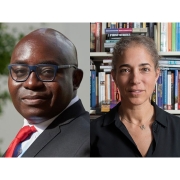Penn Biologists Find that Evolution is Unpredictable and Irreversible
In a paper published in the Proceedings of the National Academy of Sciences, University of Pennsylvania researchers show that evolution is both unpredictable and irreversible. Using simulations of an evolving protein, the researchers found that genetic mutations accepted via the process of evolution are usually dependent on prior mutations, and that once the mutations are accepted they become increasingly difficult to reverse. The team was comprised of postdoctoral researchers Premal Shah and David M. McCandlish in the Department of Biology, and Professor of Biology Joshua B. Plotkin.
Read the full story here.





